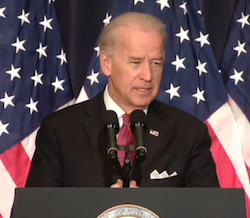Biden: "Spread of Nuclear Weapons is Greatest Threat Facing the Country"
February 19, 2010
Featured Image
We are happy to serve you a daily summary of the day's top nuclear policy stories each morning, with excerpts from the stories in bullet form.
Stories we're following today:
The Path to Nuclear Security - White House [link]
- Vice President Biden speaks at National Defense University on the future of the United States’ nuclear deterrent capabilities and lays out the plan for implementing the President’s nonproliferation and nuclear security agenda.
- The Vice President outlines how the Administration’s budget request and other efforts will support the President’s vision of reducing the nuclear dangers facing our country as we pursue the peace and security of a world without nuclear weapons.
- Watch Vice President deliver the speech, below, and for more analysis of the speech, see posts by Daily Kos' Plutonium Page and The Cable's Josh Rogin.
Stop at Start - Barry Blechman in the New York Times [link]
- One near-term objective is completion and ratification of a new Strategic Arms Reduction Treaty between the United States and Russia. But the ultimate goal, [Vice President Biden] said, remained the peace and security of a world without nuclear weapons.
- In the absence of a roadmap from a Start accord to global zero, one can only assume that Mr. Biden meant the continued pursuit of similar, incremental arms control agreements. But piecemeal control efforts will never work; we have to think more boldly if we are to achieve global nuclear disarmament.
- Here’s how a global nuclear disarmament treaty could work. First, it would spell out a decades-long schedule for the verified destruction of all weapons, materials and facilities. Those possessing the largest arsenals — the United States and Russia — would make deep cuts first. Those with smaller arsenals would join at specified dates and levels. To ensure that no state gained an advantage, the treaty would incorporate “rest stops”: if a state refused to comply with a scheduled measure, other nations’ reductions would be suspended until the violation was corrected. This dynamic would generate momentum, but also ensure that if the effort collapsed, the signatories would be no less secure than before.
Former NATO Head Wants U.S. Nukes Out of Europe - Global Security Newswire [link]
- The former head of NATO joined three other Belgian statesmen today in urging the United States to remove its remaining nuclear weapons from Europe.
- "The Cold War is over. It's time to adapt our nuclear policy to the new circumstances," according to a statement signed by former NATO chief Willy Claes, former Belgian Prime Ministers Jean-Luc Dehaene and Guy Verhofstadt and former Foreign Minister Louis Michel.
- "The U.S. tactical nuclear weapons in Europe have lost all military importance," adds the statement, which was published in a number of Belgian newspapers.
- "We call on our (Belgian) government to follow the example of the German government and to call in NATO for a rapid withdrawal of the nuclear arms," the authors wrote.
Iran Might be Seeking to Develop Nuclear Weapons Capability, Inspectors Say - Washington Post [link]
- U.N. nuclear inspectors, citing evidence of an apparently ongoing effort by Iran to obtain new technologies, publicly suggested for the first time Thursday that the country is actively seeking to develop a weapons capability.
- In a new report, the International Atomic Energy Agency also confirmed that Iran has increased the enrichment level of some of its uranium, moving the Islamic republic a step closer to being able to make weapons-grade nuclear fuel.
- The Obama administration reacted to the new report with concern, with one senior official saying that Iran is clearly moving "more and more in the direction of a weapons capability," despite repeated technical setbacks in its efforts to make enriched uranium. The new IAEA assessment found that Iran continues to have trouble with its uranium plants, although it possesses enough fuel, in theory, to make at least one bomb. "It may take them longer to get there, but the pattern of behavior is very disturbing," the official said.



